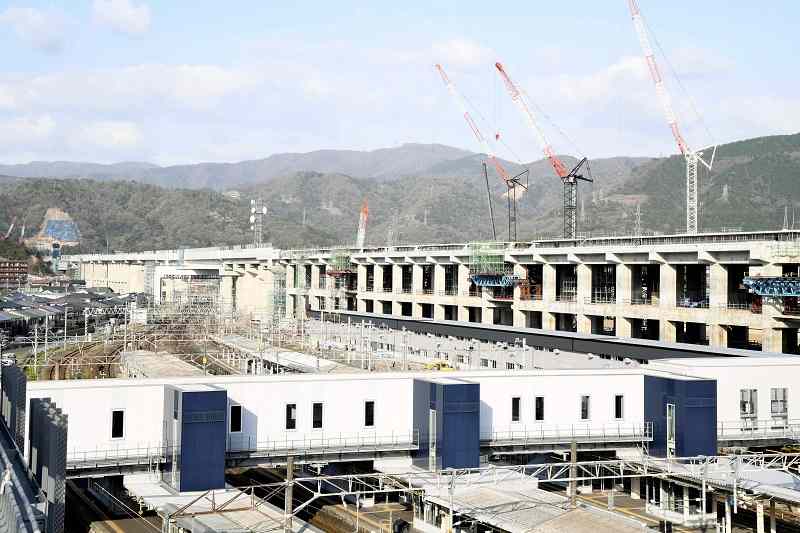
Construction of the Hokuriku Shinkansen Line is underway near JR Tsuruga Station in Tsuruga, Fukui Prefecture, in April.
14:18 JST, July 24, 0202
With a shortage of engineers having slowed down construction of a Shinkansen line, the Japan Railway Construction, Transport and Technology Agency (JRTT) will accept the help of such personnel dispatched from seven railway companies outside of the Japan Rail group.
The JRTT is a government-affiliated agency responsible for the construction of Shinkansen tracks and other facilities. The seven railways aim to improve their own technical capabilities by supporting Shinkansen extension projects.
A total of 28 engineers will be transferred to JRTT by October, including 12 from Kintetsu Railway Co., nine from Tokyo Metro Co. and two from Keio Corp. Negotiations with other companies are in progress, and the number of participating private railway companies is expected to increase.
Over the next two to three years, the engineers will assist with work on extensions of the Hokuriku and Hokkaido Shinkansen lines, plus one other project, in capacities to include designing and supervising the construction of tunnels, tracks, stations and communications facilities.
The Hokuriku Shinkansen extension was initially set to become operational in spring 2023. After the decision was made last December to postpone its opening for one year, the JRTT realized that the Shinkansen construction required help from private railway firms.
The reasons cited for the postponement were construction delays at Tsuruga Station and the additional work needed on the Kaga Tunnel. However, after receiving improvement orders from the Land, Infrastructure, Transport and Tourism Ministry, the JRTT conducted an inspection, which revealed a lack of engineers.
There were about 650 civil engineers on staff, a decrease of about 100 compared to 10 years prior because of hiring constraints and other factors.
The agency, which had many employees who were dispatched from JR companies, asked private railway firms to send their engineers.
The seven firms decided to cooperate with the Shinkansen construction because it would improve the technical skills of the companies, as the work requires the use of advanced technology. The private firms are also hoping to secure work for their employees and control labor costs due to the impact of the pandemic on their business performance.
“Construction has been declining because of the pandemic, so we decided to transfer [some of our employees],” said a spokesperson for Kintetsu Railway. “It will be a good opportunity for us to learn new methods.”
An official at Keio said, “We will be able to use this experience for our own multilevel projects and expand our network of contacts.”
Top Articles in Business
-

Prudential Life Insurance Plans to Fully Compensate for Damages Caused by Fraudulent Actions Without Waiting for Third-Party Committee Review
-

Narita Airport, Startup in Japan Demonstrate Machine to Compress Clothes for Tourists to Prevent People from Abandoning Suitcases
-

Asics Opens Factory for Onitsuka Tiger Brand in Western Japan
-

JR Tokai, Shizuoka Pref. Agree on Water Resources for Maglev Train Construction
-

KDDI Opens AI Data Center at Former Sharp Plant in Osaka Prefecture; Facility Will Provide Google’s Gemini AI Model for Domestic Users
JN ACCESS RANKING
-

Japan Institute to Use Domestic Commercial Optical Lattice Clock to Set Japan Standard Time
-

Israeli Ambassador to Japan Speaks about Japan’s Role in the Reconstruction of Gaza
-

Man Infected with Measles May Have Come in Contact with Many People in Tokyo, Went to Store, Restaurant Around When Symptoms Emerged
-

China Eyes Rare Earth Foothold in Malaysia to Maintain Dominance, Counter Japan, U.S.
-

Prudential Life Insurance Plans to Fully Compensate for Damages Caused by Fraudulent Actions Without Waiting for Third-Party Committee Review
























